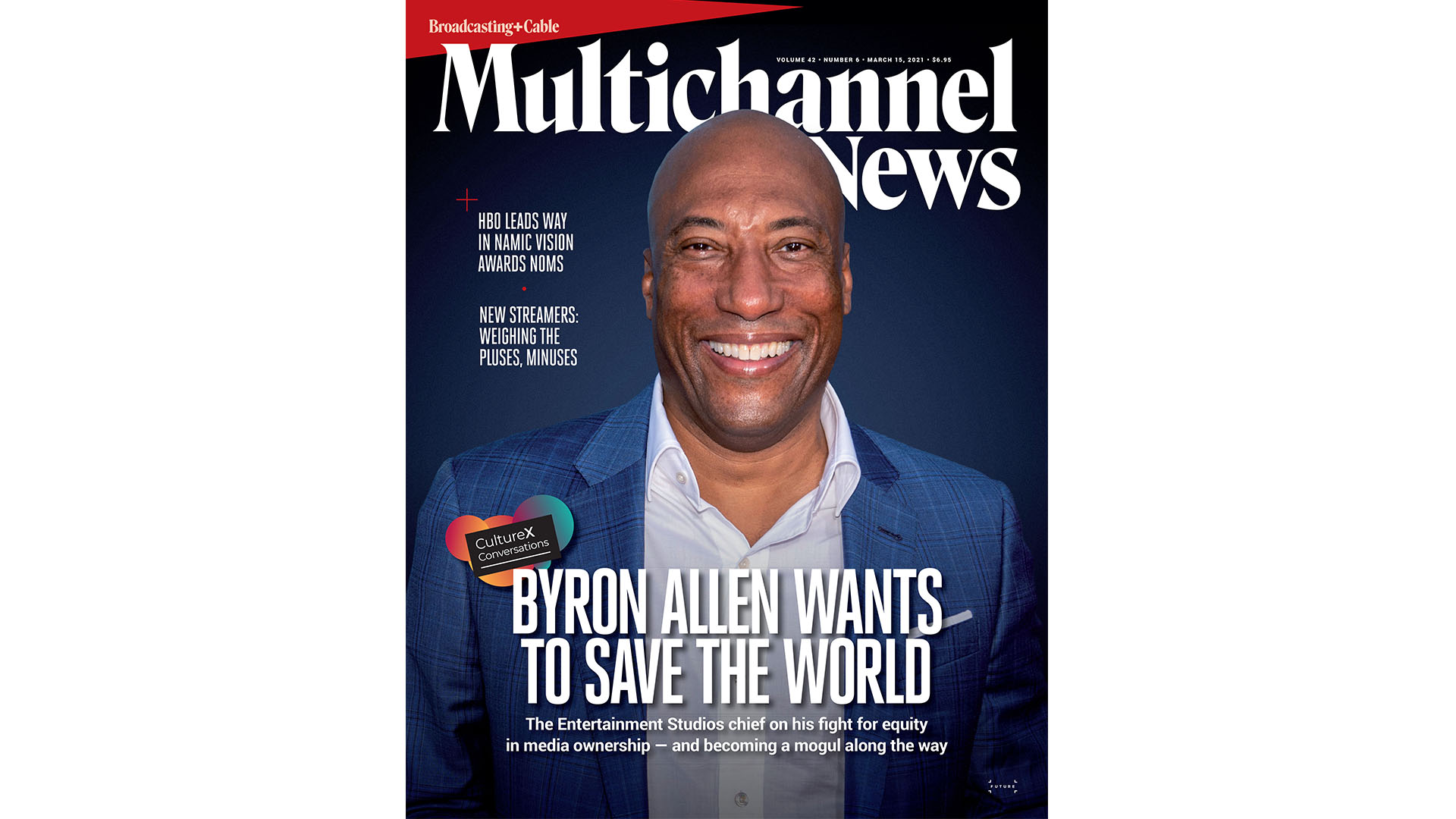
15 Mar Byron Allen Wants to Save the World
And make a little — or a lot of — money along the way
By Paige Albiniak
Byron Allen understands the power of multiplication. In the current world of streaming, subscription video-on-demand and direct-to-consumer offerings, multiplication is everything. When you charge tens of million people even just a few dollars a month, that math adds up quickly.
Allen made his money in the early days of syndication, sitting at his dining-room table, making phone call after phone call and getting on planes most days of every month. But after years of sheer hustle, with Entertainment Studios’ syndicated shows adding up their ratings in every market in America, the money started flowing.
In the past five years, Allen has metamorphosed from a peddler of syndicated shows to a media mogul after surprising the world with his $300 million acquisition of The Weather Channel in 2018, and then following that up by purchasing TV stations (notably including ABC affiliate KITV in Honolulu, one of 16 Allen-owned Big Four affiliated stations in 12 markets) and aggressively going after legacy station groups such as Tribune Media and Tegna. Looking ahead, Allen sees only expansion, with plans to spend at least $10 billion to acquire more Big Four network TV affiliates and to invest billions in his nascent streaming business and reach a global audience.
Beyond business, Allen has socio-economic issues on his mind — including climate change, racial injustice and economic inclusion — and he’s working hard to make an impact in those areas as well.
MCN contributor Paige Albiniak spoke with Allen, who is the keynote speaker at Future’s CultureX Conversations virtual event on Tuesday, March 16.
MCN: You sued cable giants Comcast and Charter in February 2015 for a total of $40 billion, with you alleging that their decisions to not carry your cable networks amounted to racial discrimination. Those lawsuits were ultimately settled, but did you feel that they achieved their ends?
BA: I can’t speak to those lawsuits anymore because they’ve been settled. But when I filed my lawsuits against the cable industry, it was really to start the process of creating economic inclusion.
Now, we’re making sure that Madison Avenue does its part. I have found Madison Avenue, quite frankly, to be very racist in its behavior and in its lack of commitment to equity inclusion as it relates to Black-owned media. Black-owned media pretty much doesn’t exist. That’s 110% because of the institutionalized racism on Madison Avenue and among Madison Avenue’s clients.
What we’ve said to Madison Avenue is that Black-owned media is completely extinct. Right now, I’m the only African-American in America in 2021 that owns a Big Four network affiliate. As a country, and as an industry, that is not a statement that should be accurate in 2021. I’m the first African-American to buy a mainstream cable network in America. Once again, as a country, we shouldn’t be proud of that. We shouldn’t be saying that in 2021.
A lot of that is because Madison Avenue hasn’t leaned in. What I’ve asked Madison Avenue today to do is, I’ve said, look, as we represent 14% of this nation, we have every right to ask for 14% of your budget, which is economic parity. And we’re not asking for economic parity, we’re asking for economic inclusion. We’re asking for a mere 2%, a minimum, and I do emphasize the word minimum, of 2%, to go to Black-owned media, not Black-targeted, but Black-owned. That’s a big difference. That creates a real unique point of view, creating diversity and inclusion while improving democracy.
Coca-Cola and McDonald’s aren’t doing business with me. Spark Ad Agency isn’t doing business with me. The litigators have already sent the letters out, letting them know that we’re preparing to sue them for billions of dollars. When Coca-Cola and McDonald’s aren’t doing business with me, then there’s no chance that Black-owned media will ever exist. So, in the same way I sued the cable industry for $40 billion, I will now start to sue Madison Avenue and their clients for $100-plus billion. Because what they’re doing is egregious. And when you think about the amount of money that they pull out of the Black community while not doing business with the Black community, it’s economic genocide, is really what it is. It’s economic genocide.
MCN: What else do you think corporate America needs to do to promote diversity and inclusion?
BA: What I would say to white corporate America is you don’t need to have a chief diversity officer. More importantly you need to — you, the chairman, the chairwoman, the leader — you need to become the chief diversity investment officer. Make sure you’re investing in people who don’t look like you and fostering greater diversity. Make sure that you are investing in women and Asian people and Hispanic people and gay people and African-American people. You need to be the leader of that.
MCN: What has the pandemic meant for Allen Media Group and Entertainment Studios?
BA: The growth because of the pandemic has been what we would call meaningful. As people went into lockdown, they went home, and national and local news became very valuable. And that happens to be the business we’re in. So we’ve got, obviously, local news. National news has been very key in the battle against COVID-19, but also as we deal with climate change.
Our cable networks are the fastest-growing cable networks in terms of distribution, simply because we didn’t have very much distribution to begin with. So we’ve been able to grow our distribution to where it’s something that advertisers are leaning in on. We’ve gotten a number of our networks into 40-, 50-plus-million homes, which, outside of The Weather Channel, is key.
Our syndicated shows have been growing, and because a number of the studios have abandoned first-run syndication, because they are taking their content and putting it on their streaming platforms, we’ve been able to really help step in and fill that void for stations.
And our streaming has grown really in a significant way because we have Local Now. Local Now is a really unique streaming platform because it uses unique proprietary software and artificial intelligence to deliver local news, weather, sports and traffic in real time, geo-fenced to your ZIP code. And that is a one-in-a-kind streaming service; no one else is able to provide that level of technology. It’s really something that has done extremely well for us. We have seen as much as 60% growth month over month.
When I bought Local Now, it came inside The Weather Channel, so I got Local Now for free. Within 18 months of buying Local Now, Altice bought Cheddar for what we believe to be a couple hundred million. Comcast bought Xumo for what we believe to be a couple hundred million. Viacom bought Pluto for $340 million and Fox bought Tubi for $440 million.
So we now have four comps that say Local Now is worth quite a bit of capital. When the insurrection happened at the nation’s capital, our traffic shot up significantly because people were able to go to Local Now and watch it in real time. You need to have an app like that that responds to the moment.
When I bought it, it didn’t have movies, TV shows, documentaries and channels. We now have all of that. I’ve spent the last three years building it out, evolving it. And we have some wonderful channels there. Johnny Carson has a channel there. Bloomberg has a channel, Kevin Hart, America’s Funniest Home Videos all have channels there. People magazine has an amazing channel there. We’ve replicated the cable ecosystem, which is costing $150 to $250 a month per subscriber, and it’s free.
MCN: What does 60% month-over-month growth look like in terms of users?
BA: The last report I got was we had about 5.8 million monthly active users, and that’s with little or no promotion. Now we’re going to start really promoting it.
MCN: Even though we just talked about Local Now, what you really bought was The Weather Channel. We just had this huge weather event across the country, resulting in an electric-grid meltdown in Texas. What do events like that mean for The Weather Channel?
BA: Well, you know, it all goes up in a significant way, because unfortunately we are dealing with global warming and climate change. Global warming is very real. Climate change is very real. And it’s the greatest threat to human beings on planet Earth.
When I first bought The Weather Channel, the network was avoiding speaking about climate change because half the people didn’t believe in it, and the other half did, and they didn’t want to offend anybody.
I called all the scientists into a room and I said, “Show of hands, please tell us if we’re in trouble, if climate change is real and a threat to human beings.” Without exception, every scientist in that room raised their hand. So I decided to go with the scientists. And I said, look, we’re not going to be Switzerland here. We’re not going to pretend like this isn’t happening. And we’re not going to worry about offending people simply because we’re telling the truth.
One of the first specials we did was called Race to Save the Planet. After it aired, the research department did some research on the special and found that 85% of our viewers really appreciated the information and wanted more, because they knew we were being honest.
We are very committed to making sure that we are delivering the best-in-class news because that’s essential to making sure that we have a strong and well-informed society and a true democracy.
MCN: Beyond Local Now, what are your plans for streaming, considering that you own all of these channels and all of this content?
BA: We’re going to invest very heavily in our streaming platforms. We’re better prepared than anybody to go direct to the consumer, because we own all the premium dot-TVs and have the content to go with them. That’s why we own all the premium dot-TVs, such as cars.tv, comedy. tv, Pets.tv and on and on. We’re better positioned than anybody to go direct to the consumer with over 4 billion worldwide connected devices.
We own 100% of our content, and most of it was shot without a host. We use voiceover, which means you can use artificial intelligence and put that content in 200 different languages.
If you look at broadcast TV in the ’60s, ’70s, it was broad. And then in the ’70s, ’80s, and ’90s, it became focused, and that’s when you got MTV and BET and VH1 and Lifetime and Nickelodeon and CNBC or whatever. Like then, I believe streaming is going to become focused pretty quickly. And people are going to say I have Netflix and Disney Plus and Amazon, but I also want Comedy.tv. I want Sports.tv. I want Cars.tv.
You’re going to start to see us really invest heavily in our direct-to-consumer streaming content. We’ve been sitting on these URLs for about 15 years waiting for this streaming explosion.
MCN: Would you take those networks and put them on Local Now? Or would you build a new streaming platform?
BA: Local Now will be on its own and be an aggregator of everything free. And then some of these services will be subscription video-on-demand streaming direct to the consumer for $4.99 a month.
MCN: You’ve also been saying for several months now that you intend to spend $10 billion acquiring Big Four network affiliates. How is that looking?
BA: We are 110% committed to investing approximately $10 billion to buy Big Four network affiliates. And we will do that within 24 months, if not this year.

 Read the full article here.
Read the full article here.
